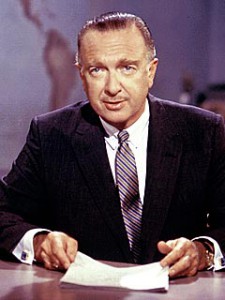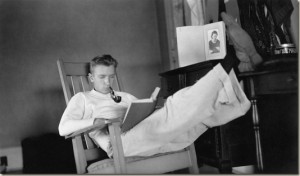Who Was Walter Cronkite?
How did Walter Cronkite become “the most trusted man in America”?
Walter Cronkite was born in St. Joseph, Missouri on November 1, 1916. Walter and his parents, Helen Lena and Dr. Walter Leland Cronkite lived in Kansas City, Missouri until the age of ten, when his father moved the family to Houston, Texas for a dentistry job.
Walter first was thrust into the world of journalism as a 16-year-old student at San Jacinto High School when journalism instructor, Fred Birney, named him the editor of the school newspaper. After working for the paper for a few years, Birney secured Walter a job as the Houston Post’s correspondant to the University of Texas in Austin when he was just 19-years-old. Walter also attended The University of Texas, where he worked on the Daily Texan student newspaper.
Cronkite dropped out of college in the fall of 1935 after starting a series of newspaper reporting jobs. At this point, Cronkite got his first taste of broadcast journalism. He became a radio announcer for WKY in Oklahoma City, Oklahoma. The next year, he was hired at KCMO radio station in Kansas City, Missouri as the sole member of the entire news and sports departments. It was at KCMO that Cronkite would meet his future wife, Mary Elizabeth Maxwell, better remembered as “Betsy”. Betsy and Cronkite would remain married until her death in 2005.

Cronkite joined the United Press, an international news agency and wire service, in 1937. In 1939, Walter was sent overseas to cover the events of World War II where he became known as one of the best American war reporters. In his time overseas, Cronkite covered important events such as the Normany Invasion, the Seige of London, the North African campaigns, and the Battle of the Buldge during his time with the United Press. Cronkite was one of eight journalists who were chosen by the United States Army Air Forces to fly bombing raids over Germany in a B-17 Flying Fortress as a member of a group of journalists called the “Writing 69th”. After the war was won, Walter covered the Nuremberg Trials and continued to work as the United Press’ main reporter in Moscow for two more years from 1946 to 1948.
Cronkite joined CBS News in its new television division in 1950 after being recruited by Edward R. Murrow. Cronkite began to work at WTOP-TV, the CBS affiliate in Washington, D.C.. Cronkite served as anchor of the 15-minute late-Sunday-evening newscast Up To the Minute from 1951 to 1962. It was at CBS in the 1950’s that Cronkite was first referred to as an “Anchorman” a new term that instantly stuck.
From 1953 to 1957, Cronkite hosted the CBS program You Are There which reenacted historical events using the format of an old news report. Another assignment was The Morning Show, CBS’s attempt at challenging NBC’s Today in 1954. Cronkite would interview guests while chatting with a lion puppet named Charlemane about the news.
Cronkite was also the lead broadcaster of CBS’s coverage of the 1960 Winter Olympics. It was the first time ever that an event like the olympics was televised in the United States.
On April 16, 1962, Cronkite replaced Douglas Edwards as Anchorman of the CBS Evening News, a job for which would transform him into an american icon. Cronkite was in the right place at the right time; a year after becoming anchor the program expanded from 15 minutes to an unprecedented 30 minutes. Walter Cronkite had become the anchorman for American network televisions first nightly half-hour news program. In an era where ABC, NBC, and CBS were the only broadcast networks, Cronkite had become the predominant voice and face of american news media. This exposure granted him unparalleled influence over the American public.
When Cronkite first took over as anchor of the CBS Evening News, the program was chronically behind NBC’s Huntley-Brinkley Report in ratings for most of the 1960s. Late in the decade, RCA made a decision to not fund NBC news at the level that CBS was willing to fund CBS News. Because of this, CBS earned a reputation for having greater resources, accuracy, and depth to their broadcasts. Cronkite’s history with United Press wire service aided this perception of unbiased reporting, and in 1967 CBS Evening News beat The Huntley-Brinkley Report in viewership.
After reporting on the Apollo 11 and Apollo 13 moon missions, Cronkite received the best ratings of all the network anchors, and made CBS the most-watched TV network for the mission coverage. During the moon landing broadcast in 1969, nearly two out of three american homes were tuned to CBS to hear Cronkite report on the events. The next year, Chet Huntley retired, and the CBS Evening News began to dominate the American TV news audience.

Walter Cronkite would continue to be top-rated until his retirement announcement in 1981. Cronkite is today the broadcast journalist by which all others will forever be compared. It is somewhat astonishing to believe today that Cronkite, a news anchor, was surveyed as “the most trusted man in America”, since todays mainstream media is so heavily dissected and criticized on a daily basis.
Cronkite trained himself to speak only 124 words per minute, about 40 less than the national average, to help viewers understand him. In Cronkite’s eyes, it was his job to report the news, not what he thought of the news. Cronkite is famous not only for his impartiality and journalistic integrity, but the few recorded instances of emotion he expressed on air. These instances, including the moon landing, assassination of JFK, and his editorial about the stalemate in Vietnam humanized the Anchorman, and helped earn him the fond nickname of, “Uncle Walter”. Americans really felt as if Cronkite was a member of their family, and for good reason, for 20 years nearly 25 million americans tuned into CBS everynight, to hear Uncle Walter report the days news.
Walter Cronkite was always first a journalist, but became an American icon and a true celebrity.
Walter Cronkite died in July 2009 at the age of 92 due to complications related to dementia.




Cronkite would sneer at the numerous and glaring copy editing errors in this article.
I doubt it, being that he was a kind soul. He would probably assist them instead.
Kolkata Escorts Have High Profile Well Educated, VIP Call Girls in Kolkata. Visit Site https://www.butterflyhaven.org
Thanks for sharing an extremely decent article. Visit:rusia777 login
Your articles have helped me navigate through some tough challenges, and I feel more confident and equipped to handle them because of your insights. kaikoslot
Thanks for taking the time to go over this particular, Personally i think highly about it and adore understanding more on this topic. If at all possible, Hotplay88 as you acquire expertise, can you mind upgrading your site with increased information? It is extremely helpful for me.
tstoto
tstoto
tstoto
tstoto
Increíble articulo gracias, visita comicsporno
Login KENZO123 adalah situs judi online dengan slot gacor terbaik.